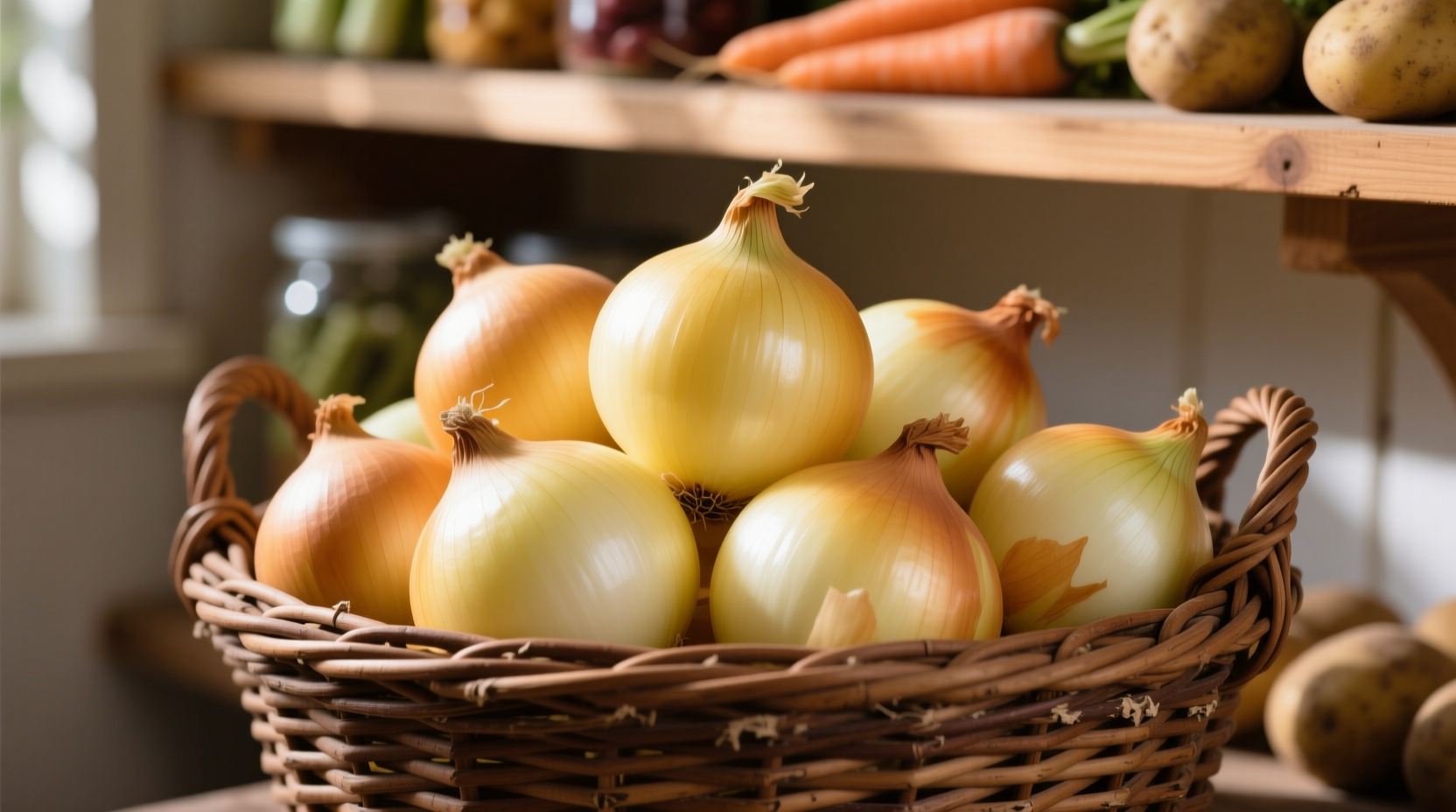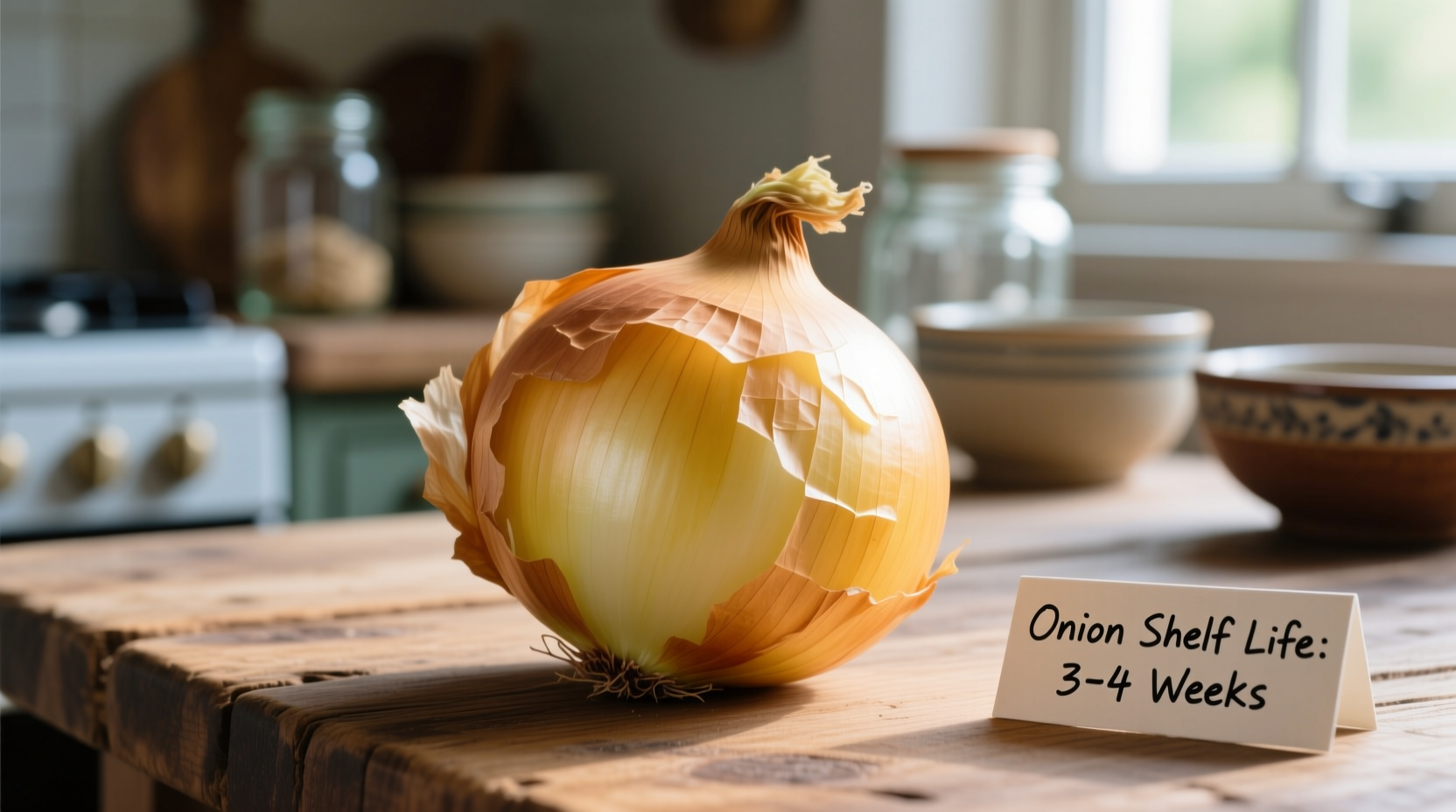Discover exactly how long onions remain safe and flavorful under various storage conditions. Whether you're meal prepping, storing leftovers, or planning your grocery shopping, understanding onion shelf life prevents food waste and ensures optimal taste in your dishes.
Why Onion Longevity Matters for Your Kitchen
Onions rank among the most versatile kitchen staples, yet their shelf life varies dramatically based on storage conditions. Improperly stored onions not only lose flavor but can develop harmful bacteria. According to the USDA Food Safety and Inspection Service, improper storage of produce accounts for nearly 30% of household food waste. Understanding proper onion storage directly impacts both your cooking quality and food budget.
| Storage Method | Whole Onions | Cut Onions |
|---|---|---|
| Pantry (cool, dry place) | 2-3 months | N/A |
| Refrigerator (unpeeled) | 1-2 months | N/A |
| Refrigerator (peeled) | N/A | 10-14 days |
| Refrigerator (cut) | N/A | 7-10 days |
| Freezer | 6-8 months | 6-8 months |
Factors That Determine Onion Shelf Life
Several critical elements influence how long onions remain fresh. The UC Davis Postharvest Technology Center identifies three primary factors affecting onion longevity:
1. Humidity Control
Onions require low humidity (65-70%) to prevent mold growth. High moisture environments accelerate spoilage. Store onions away from sinks, dishwashers, and other moisture sources. Never store onions in plastic bags, which trap moisture and promote decay.
2. Temperature Stability
Fluctuating temperatures cause onions to sprout prematurely. The ideal storage temperature ranges between 45-55°F (7-13°C). Room temperature storage works well in most homes, but avoid placing onions near stoves, ovens, or heating vents.
3. Proper Ventilation
Onions need airflow to maintain freshness. Use mesh bags, baskets, or paper bags with holes rather than sealed containers. The USDA recommends storing onions in a single layer to maximize air circulation around each bulb.

Recognizing When Onions Have Gone Bad
Knowing the signs of spoilage prevents foodborne illness. Discard onions showing any of these indicators:
- Soft or mushy spots - indicates internal decay
- Mold growth - appears as fuzzy white, green, or black patches
- Unpleasant odor - sour or ammonia-like smell
- Excessive sprouting - long green shoots indicate significant aging
- Darkened or slimy layers - especially on cut surfaces
According to FoodSafety.gov, if mold appears on one onion in a storage container, inspect all nearby onions as mold spores can spread invisibly. When in doubt, throw it out—consuming spoiled onions can cause food poisoning with symptoms including nausea, vomiting, and diarrhea.
Proven Storage Techniques for Maximum Freshness
Implement these professional chef-tested methods to extend your onions' shelf life:
Pantry Storage for Whole Onions
Store whole, unpeeled onions in a cool, dark, well-ventilated area. Never store onions near potatoes, which release moisture and gases that accelerate onion spoilage. The FoodKeeper app from USDA recommends keeping onions in a single layer in a mesh bag suspended in your pantry.
Refrigeration for Cut Onions
Place cut onions in an airtight container with minimal air space. Adding a paper towel absorbs excess moisture. Store toward the front of the refrigerator where temperatures are most consistent. Never store cut onions in metal containers, which can cause flavor changes.
Freezing for Long-Term Storage
Freezing extends onion life significantly. Chop onions, spread on a baking sheet, freeze until solid, then transfer to freezer bags. Frozen onions work perfectly for cooked dishes but lose crispness for raw applications. The National Center for Home Food Preservation confirms frozen onions maintain quality for 6-8 months.
Special Considerations for Different Onion Types
Not all onions share identical shelf lives. Understanding these differences prevents premature spoilage:
- Yellow onions - longest shelf life (2-3 months)
- Red onions - slightly shorter life (1-2 months)
- White onions - most perishable (3-4 weeks)
- Shallots - similar to yellow onions (2-3 months)
- Green onions - shortest shelf life (7-10 days refrigerated)
Storage conditions significantly impact these timelines. The University of Minnesota Extension notes that red onions develop mold more quickly than yellow varieties when exposed to moisture.
Practical Tips for Using Aging Onions
When onions show early signs of aging but remain safe to eat, maximize their use:
- Use slightly soft onions immediately in cooked dishes
- Remove any green sprouts before cooking
- Make onion jam or marmalade with aging onions
- Freeze excess before quality declines further
- Use in soups or stews where texture matters less
Professional chefs often note that onions nearing the end of their prime develop sweeter flavors, making them ideal for caramelizing. However, never use onions with visible mold or strong off-odors, even in cooked dishes.
Frequently Asked Questions
Can you eat onions after the expiration date?
Yes, if properly stored and showing no signs of spoilage. The 'best by' date indicates peak quality, not safety. Whole onions often remain safe for months past this date when stored correctly in a cool, dry place.
Why do my onions sprout so quickly?
Onions sprout due to warm temperatures, high humidity, or exposure to light. Store onions in a cool (45-55°F), dark place with good ventilation. Never store near potatoes, which release gases that accelerate sprouting.
How can you tell if a refrigerated onion has gone bad?
Check for slimy texture, dark spots, mold growth, or sour smell. Peeled or cut onions should remain firm and crisp. If any layer shows spoilage, discard the entire onion as bacteria may have spread internally.
Do cooked onions last longer than raw onions?
No, cooked onions actually have a shorter shelf life. Store cooked onions in an airtight container in the refrigerator for 3-5 days. The cooking process introduces moisture and breaks down protective layers, accelerating spoilage compared to raw onions.
Can you freeze whole onions without chopping them?
Yes, but whole frozen onions become difficult to peel and use. For best results, peel whole onions before freezing. They'll maintain better texture and be ready to use directly from the freezer in cooked dishes without thawing.











 浙公网安备
33010002000092号
浙公网安备
33010002000092号 浙B2-20120091-4
浙B2-20120091-4